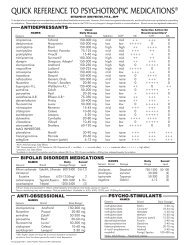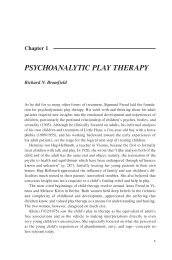IRAQ WAR CLINICIAN GUIDE
Iraq War Clinician's Guide - Network Of Care
Iraq War Clinician's Guide - Network Of Care
You also want an ePaper? Increase the reach of your titles
YUMPU automatically turns print PDFs into web optimized ePapers that Google loves.
Iraq War Clinician Guide 27 Background and Assessment<br />
P<br />
produce a hypervigilant internal focus of attention on subtle bodily reactions and sensations,<br />
which may lead to a variety of somatic complaints.<br />
Assessment<br />
New veterans of the war with lraq will present initially in a myriad of different ways. Some may be<br />
very frail, labile, emotional, and needing to share their story. The modal presentation is likely to be<br />
defended, formal, respectful, laconic, and cautious (as if they were talking to an officer).<br />
Generally, it is safe to assume that it will be difficult for new veterans of the lraq War to share their<br />
thoughts and feelings about what happened during the war and the toll those experiences have<br />
taken on their mental health. It is important not to press any survivor of trauma too soon or too<br />
intensely and respect the person's need not to feel vulnerable and exposed. Clinical contacts<br />
should proceed from triage (e.g., suicidality/homicidality, acute medical problems, and severe<br />
family problems may require immediate attention), screening, formal assessment, to case<br />
formulation /treatment planning, with an emphasis on prioritizing targets for intervention. In all<br />
contacts, the clinician should meet the veteran where he or she is with respect to immediate<br />
needs, communication style, and emotional state. Also, the clinician should provide the veteran a<br />
plan for how the interactions may proceed over time and how they might be useful. The goal in<br />
each interaction is to make sure the veteran feels heard, understood, respected, and cared for.<br />
Comprehensive assessment will inform case formulation and treatment planning. There are many<br />
potentially important variables to assess when working with a veteran of the lraq War:<br />
Work functioning<br />
Interpersonal functioning<br />
Recreation and self-care<br />
Physical functioning<br />
Psychological symptoms<br />
Past distress and coping<br />
Previous traumatic events<br />
Deployment-related experiences<br />
Often, when working with individuals who have been exposed to potentially traumatic<br />
experiences, there is pressure to begin with an assessment of traumatic exposure and to encourage<br />
the veteran to immediately talk about his or her experiences. However, our recommendation is<br />
that it is most useful to begin the assessment process by focusing on current psychosocial<br />
functioning and the immediate needs of the veteran and to assess trauma exposure, as necessary,<br />
later in the assessment process. While we discuss assessment of trauma history more fully below, it<br />
is important to note here that the best rule of thumb is to follow the patient's lead in approaching a<br />
discussion of trauma exposure. Clinicians should verbally and non-verbally convey to their<br />
patients a sense of safety, security and openness to hearing about painful experiences. However, it<br />
is also equally important that clinicians do not urge their patients to talk about traumatic<br />
experiences before they are ready to do so.<br />
Workfunctioning. Work-related difficulties can have a significant impact on self-efficacy, selfworth<br />
and financial stability and thus deserve immediate attention, assessment, and referral. They<br />
are likely to be a major focus among veterans of the lraq War. Part-time military employees or<br />
reservists (who make up a significant proportion of the military presence in Iraq) face unique<br />
employment challenges post-deployment, Employers vary significantly in the amount of emotional<br />
and financial support they offer their reservist employees. Some veterans will inevitably have to<br />
confront the advancement of their co-workers while their own civilian career has stalled during<br />
their military service. While some supportive employers supplement reservist's reduced military<br />
DEPARTMENT OF VETERANS AFFAIRS<br />
NATIONAL CENTER FOR PTSD




